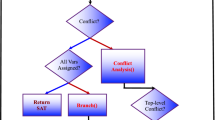Abstract
When a new (global) constraint is introduced in local search, measures for the penalty and variable conflicts of that constraint must be defined, and incremental algorithms for maintaining these measures must be implemented. These are complicated and time-consuming tasks, which clearly reduces the productivity of the local-search practitioner. We introduce a generic scheme that, from a description of a constraint in monadic existential second-order logic extended with counting, automatically gives penalty and variable-conflict measures for such a constraint, as well as incremental algorithms for maintaining these measures. We prove that our variable-conflict measure for a variable x is lower-bounded by the maximum penalty decrease that may be achieved by only changing the value of x, as well as upper bounded by the penalty measure. Without these properties, the local search performance may degrade. We also demonstrate the usefulness of the approach by replacing a built-in global constraint by a modelled version, while still obtaining competitive results in terms of runtime and robustness. This is especially attractive when a particular (global) constraint is not built in.
Similar content being viewed by others
References
Aarts, E., & Lenstra, J. K. (Eds.) (1997). Local search in combinatorial optimization. New York: Wiley.
Ågren, M., Flener, P., & Pearson, J. (2005). Incremental algorithms for local search from existential second-order logic. In P. van Beek (Ed.), Proceedings of CP’05. LNCS (Vol. 3709, pp. 47–61). Berlin Heidelberg New York: Springer.
Ågren, M., Flener, P., & Pearson, J. (2005). Set variables and local search. In R. Barták & M. Milano (Eds.), Proceedings of CP-AI-OR’05. LNCS (Vol. 3524, pp. 19–33). Berlin Heidelberg New York: Springer.
Ågren, M., Flener, P., & Pearson, J. (2006). Inferring variable conflicts for local search. In F. Benhamou (Ed.), Proceedings of CP’06. LNCS (Vol. 4204, pp. 665–669). Berlin Heidelberg New York: Springer.
Azevedo, F., & Barahona, P. (2000). Applications of an extended set constraint solver. In Proceedings of the ERCIM / CompulogNet Workshop on Constraints.
Bohlin, M. (2004). Design and Implementation of a Graph-based Constraint Model for Local Search. PhL thesis, Mälardalen University, Västerås, Sweden.
Galinier, P., & Hao, J.-K. (2000). A general approach for constraint solving by local search. In Proceedings of CP-AI-OR’00.
Gervet, C. (1997). Interval propagation to reason about sets: Definition and implementation of a practical language. Constraints, 1(3), 191–244.
Glover, F., & Laguna, M. (1993). Tabu search. In Modern Heuristic Techniques for Combinatorial Problems (pp. 70–150). New York: Wiley.
Immerman, N. (1998). Descriptive complexity. Springer.
Michel, L., & Van Hentenryck, P. (1997). Localizer: A modeling language for local search. In G. Smolka (Ed.), Proceedings of CP’97. LNCS (Vol. 1330, pp. 237–251). Berlin Heidelberg New York: Springer.
Michel, L., & Van Hentenryck, P. (2002). A constraint-based architecture for local search. ACM SIGPLAN Not., 37(11), 101–110 (Proceedings of OOPSLA’02).
Nareyek, A. (2001). Using global constraints for local search. In E. C. Freuder & R. J. Wallace (Eds.), Constraint programming and large scale discrete optimization. DIMACS: Series in discrete mathematics and theoretical computer science (Vol. 57, pp. 9–28). Providence, RI: American Mathematical Society.
Puget, J.-F. (1996). Finite set intervals. In Proceedings of CP’96 Workshop on Set Constraints.
Smith, B. M., Brailsford, S. C., Hubbard, P. M., & Williams, H. P. (1996). The progressive party problem: Integer linear programming and constraint programming compared. Constraints, 1, 119–138.
Tack, G., Schulte, C., & Smolka, G. (2006). Generating propagators for finite set constraints. In F. Benhamou (Ed.), Proceedings of CP’06. LNCS (Vol. 4204, pp. 575–589). Berlin Heidelberg New York: Springer.
Van Hentenryck, P., & Michel, L. (2005). Constraint-based local search. The MIT Press.
Van Hentenryck, P., & Michel, L. (2006). Differentiable invariants. In F. Benhamou (Ed.), Proceedings of CP’06. LNCS (Vol. 4204, pp. 604–619). Berlin Heidelberg New York: Springer.
Van Hentenryck, P., Michel, L., & Liu, L. (2004). Constraint-based combinators for local search. In M. Wallace (Ed.), Proceedings of CP’04. LNCS (Vol. 3258, pp. 47–61). Berlin Heidelberg New York: Springer.
Walser, J. P. (1999). Integer optimization by local search: A domain-independent approach. In LNCS (Vol. 1637). Berlin Heidelberg New York: Springer.
Author information
Authors and Affiliations
Corresponding author
Additional information
Part of this work was done while Pierre Flener was a Visiting Faculty Member at Sabancı University in İstanbul, Turkey.
Rights and permissions
About this article
Cite this article
Ågren, M., Flener, P. & Pearson, J. Generic Incremental Algorithms for Local Search. Constraints 12, 293–324 (2007). https://doi.org/10.1007/s10601-007-9021-0
Published:
Issue Date:
DOI: https://doi.org/10.1007/s10601-007-9021-0




